Experts from Legal Development Network and Ukrainian Helsinki Human Rights Union received first results of local self-government monitoring
Publication date: August 16, 2018
Experts of the Legal Development Network (LDN) and the Ukrainian Helsinki Human Rights Union (UHHRU) continue to carry out public monitoring of local self-government bodies in five regions of Ukraine: Lviv, Rivne, Ivano-Frankivsk, Khmelnytsky and Chernihiv. They primarily focus on respect for human rights. The monitoring is based on the methodology of the Local Human Rights Index (LHRI).
The field work of the monitors is now complete and it is time to summarize the results and outline recommendations for the local self-government authorities. In addition, monitors working in the region of Ivano-Frankivsk held a series of meetings in July where they discussed the results of the monitoring with the municipal police officers in the cities of Dolyna and Bolekhiv, as well as in the Vytvytsk Unified Territorial Community (UTC).
“All local governments were willing to cooperate: they provided us with information, sometimes even after work, – says project expert Andriy Maletyn. – We were all eager to work and see some kind of picture. However, the results of the monitoring have not completely satisfied everyone. On the side of local governments there are remarks regarding the indexes themselves. The thing is that a number of index criteria do not apply to cities of sub-regional significance, so a certain part of their activities is difficult to assess. That means that there is a need for better adaptation of the index to the local conditions”.
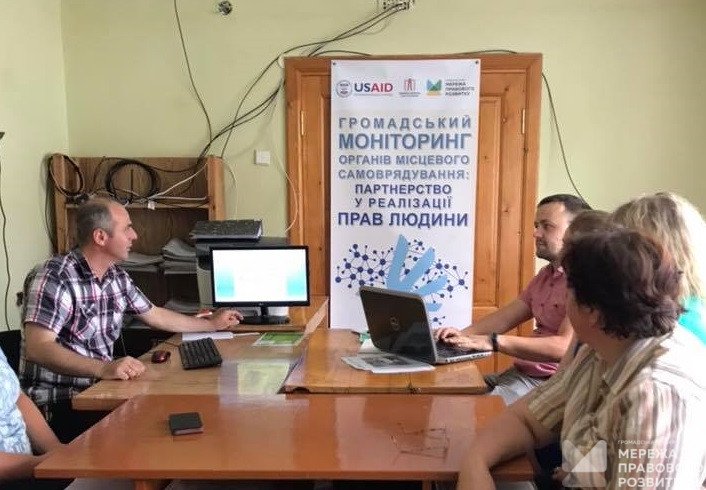
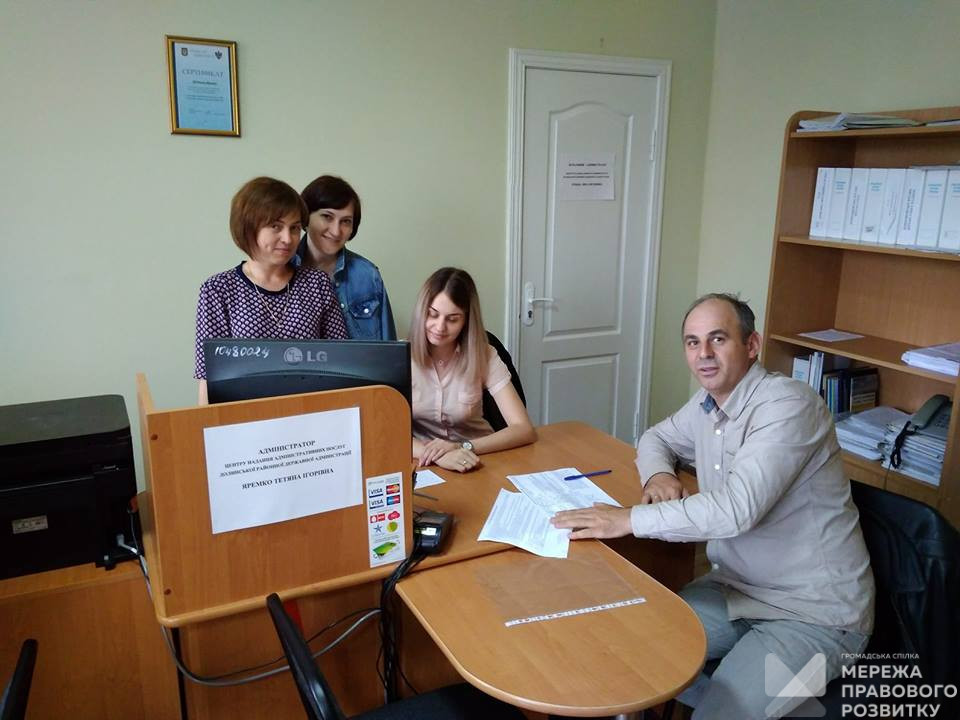 In the picture: expert of the project Andriy Maletyn during the experiment in the Dolyna Administrative Services Center (Ivano-Frankivsk region)
In the picture: expert of the project Andriy Maletyn during the experiment in the Dolyna Administrative Services Center (Ivano-Frankivsk region)
In addition to the preparation of monitoring reports the experts of the Legal Development Network in Khmelnytskyi region analyzed the court cases of the Khmelnytsky City Council, the Dunaevetska UTC and the Slobodsko-Kulchievetskaya UTC. They also held preliminary talks with the local authorities on the organization of meetings, where the results of the monitoring will be discussed.
LDN monitors working in the Chernihiv region conducted an additional experiment at school # 24 in Chernihiv. As a part of the Local Human Rights Index, the “School” experiment includes a number of indicators. Monitors collect data in the media, on-line resources, and directly at school. For example, they check whether the distance from the school to the houses of the service area does not exceed 800 m, whether the students can use public transportation; they are also checking the media for facts of non-compliance with the temperature regime. At school they check if there is a pedestrian crossing near the educational institution, the accessibility of the school for the for children with disabilities, the availability of a medical worker at school, the condition of school premises (gym, assembly hall, etc) is also assessed. The monitors check whether there activities aimed at respect for diversity are being held at school. They also check other indicators, awarding the scores respectively.
“Representatives of Chernihiv local self-government show positive attitude towards the monitoring, they are easy to contact, – Iryna Biryuk, monitor in Chernihiv region, shares her impressions. – Such monitoring, of course, is needed. It encourages better community work in the field. I think it is useful for local authorities. Each inspection gives their conclusions, and everyone will think again if everything is done correctly, or maybe some mistakes were made that they might not have paid attention to in everyday life. And when they see these errors in the monitoring process, they correct them very quickly and appropriately”.
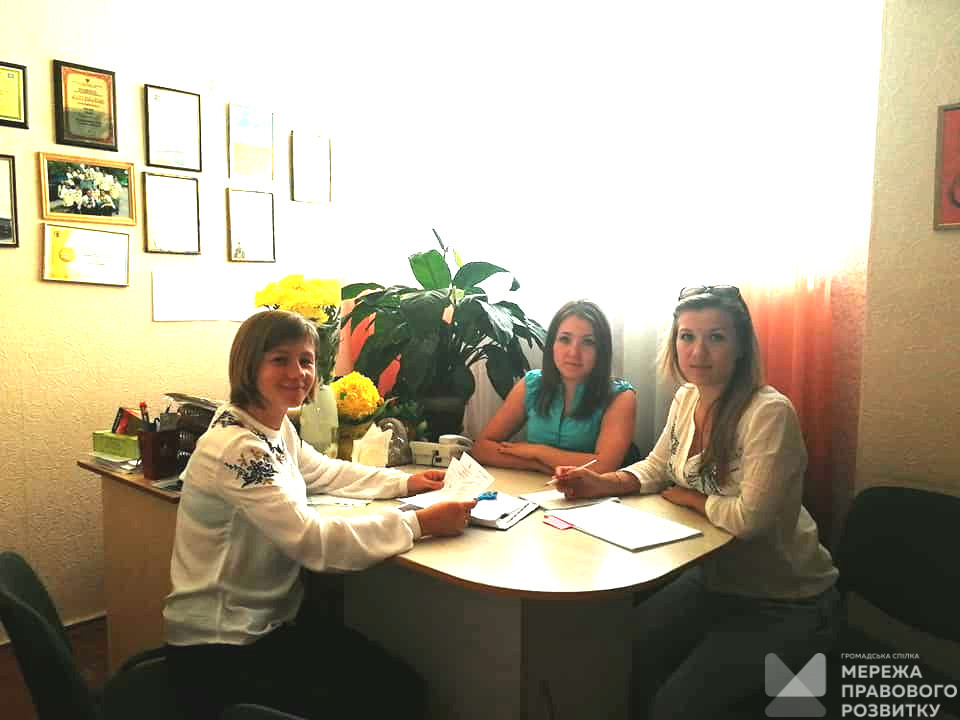
One of the tasks that monitors perform within the project is the study of websites, particularly from the point of view of the availability of information contained therein for people with disabilities.
Thus Olena Romanova, member of the monitoring group in the Rivne region and UHHRU expert, evaluated the websites of Rivne and Ostroh city councils, as well as Piskovskaya UTC. The monitor concluded that the online resources of the Rivne and Ostroh City Councils did not meet the standards of access for users with impaired sight and hearing problems.
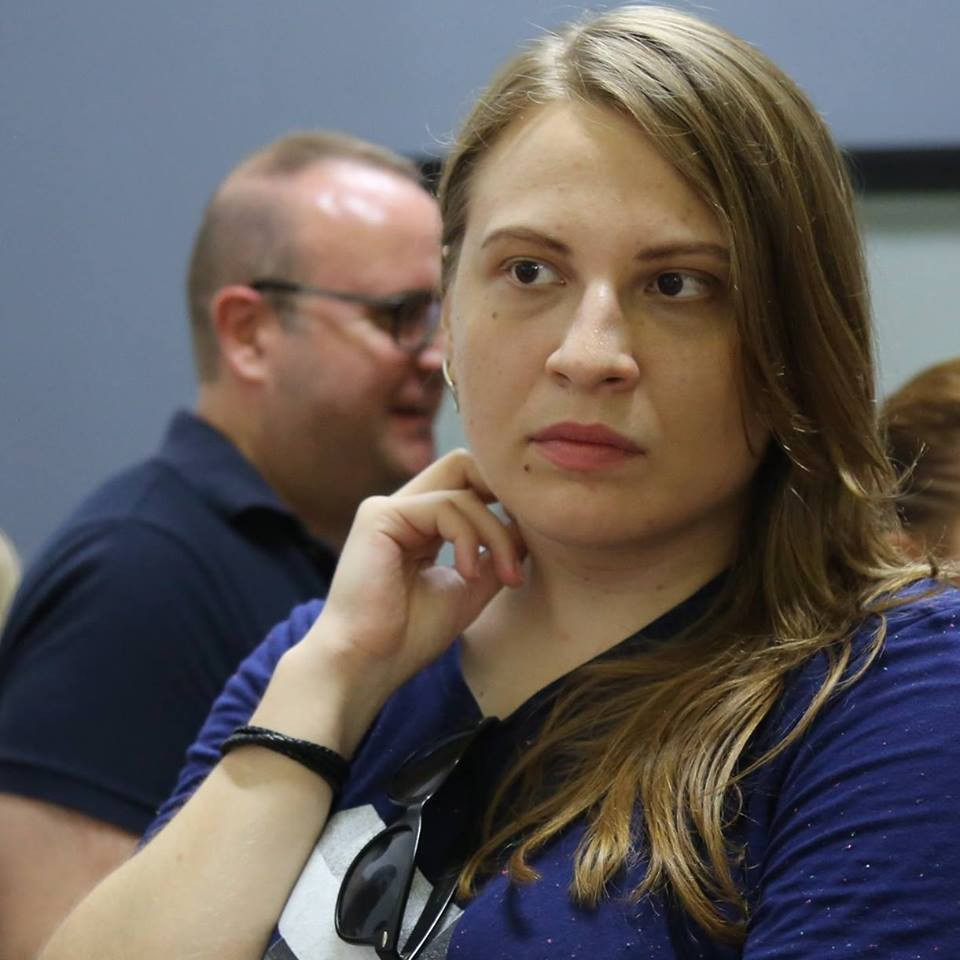
According to O.Romanova, this is due to the lack of monitoring by the State Committee for Television and Radio of the local self-government bodies’ websites. In addition, there is no explicit liability for non-compliance with the relevant legislative requirements.
To resolve this problem, it is necessary to distribute a direct order with the requirements to websites of executive authorities, including the websites of local self-government bodies. In addition, a controlling authority should be defined. It need to have the power to hold accountable for non-compliance with the requirements for ensuring the availability of information for people with visual and hearing impairment.
For more information on monitoring the local self-government websites from the point of view of the availability of information, please refer to Olena Romanova‘s article “Local Authorities’ Internet Sites as Availability Areas: Looking for an Answer within the Local Human Rights Index”, which is posted on the National Human Rights Index via the link https://bit.ly/2MlR6Ka.
Project participants note that the local self-government authorities usually respond to their needs providing all the necessary information. However, there are exceptions when the required data is missing and public queries are ignored.
“Why does it happen? There are several possible answers – from shame for their management or concealing of shameful corruption practices – to inadequate explanations provided by the monitors on the benefits of monitoring, – explains Andriy Galay, UHHRU expert and coordinator of the program “Local Human Rights Index” .- But the main question is not “who is to blame?” but “what has to be done”? So it is necessary to continue monitoring and to draw conclusions from it. Objectively and evidence-based. Therefore, we need to try once again to explain to local top officials that you will not be able to play hide and seek. We have repeatedly emphasized – this monitoring is not against, but for the authorities. Effective and focused on people”.
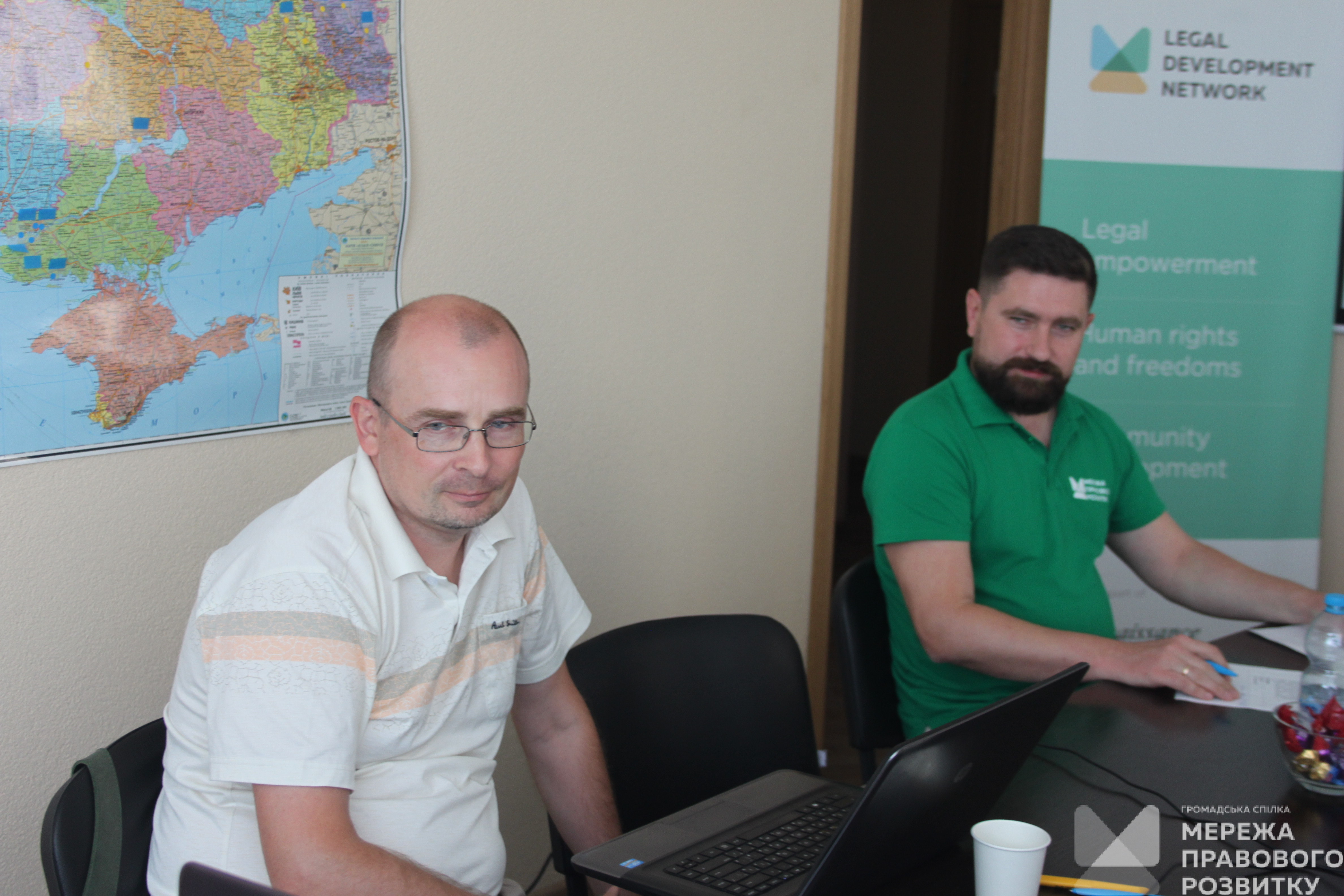
More details about the challenges during the monitoring are provided in the article by Andriy Galay “No data – 0 points. Provided that they were looking diligently”. The article can be found at https://bit.ly/2M8FUod.
An important prerequisite for obtaining objective and impartial monitoring results is constant coordination and close cooperation of all project participants. On August 2, a meeting of the project expert group composed of LDN and UHHRU representatives took place in Kyiv. The participants agreed on a joint approach to preparation of the final reports on each community based on the recommendations the UHHRU experts have provided before. Once again, the experts emphasized the necessity to adhere to such principles of the Local Human Rights Index as evidence-based and unambiguous interpretation of the index criteria. The participants of the meeting have also planned further steps to implement the project.
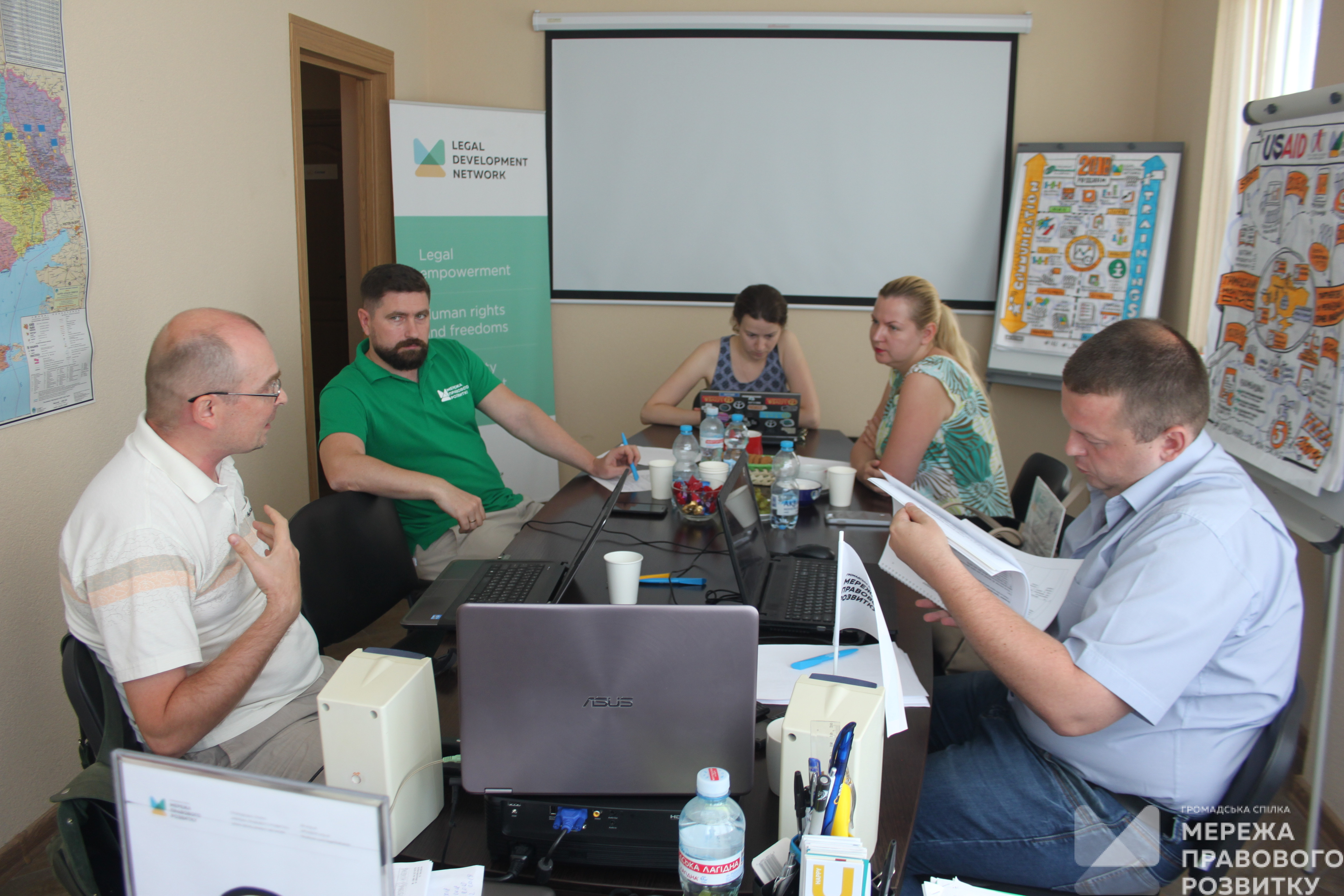
In the upcoming months the project expert group will analyse the legal policies and practices of the local governments from the point of view of respecting human rights and protecting the rights of vulnerable groups of the population, investigate the practice of implementing local policies and programs, and how citizens’ participation in decision-making is ensured on the local level.
Based on the results of this work, experts will identify top 10 best practices and top 10 violations. They will also develop recommendations for local governments on how to improve local policies and programs from the point of view of human rights protection. They will also prepare proposals to increase public participation in decision making and monitoring of local self-government activities.
The project of the Legal Development Network “Public Monitoring of Local Self-Governance: Partnership in the Implementation of Human Rights” is being implemented with the support of the American people provided through the United States Agency for International Development (USAID) within the framework of the New Justice Program.
Author: Sergiy Rybak, Legal Development Network Communications Manager
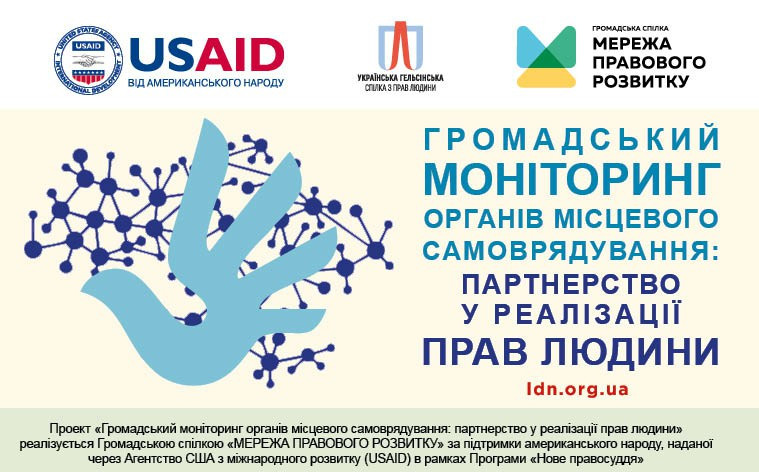
P. S. In June 2024, the Legal Development Network (LDN) launched a crowdfunding campaign, Recovery of The South of Ukraine , as part of the crisis response program #StandWithUkraine.
You can Recovery of The South of Ukraine |
If you have notices an error on the web-site, please, highlight the text and press ctrl-enter.
Have you found your solution? Help others!
Print a poster
Print and place the Network's poster on a notice board in your entrance hall
Become a volunteer
Become a volunteer and assist others in finding problem solutions
Do you need a consultation ?
Online chat
Поставте питання, i один з експертiв Мережi надасть вiдповiдь.
Графік роботи чату: з 10:00 до 16:00
щодня
(обідня перерва з 13:00 до 14:00).
Chatbot
Поставте питання через LawLink Bot в будь-який зручний спосіб. LawLink Bot — це розумний та цифровий юридичний помічник, якого створила Мережа правового розвитку.

